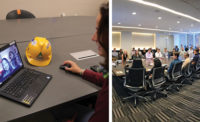Borderless Learning








Iceland’s erupting volcano and the breadth of global disruption it caused last spring is a clear indication of “just how connected the world is,” says Lester Gerhardt, an electrical and computer engineering professor at Rensselaer Polytechnic Institute, Troy, N.Y.
He would know. Gerhardt leads global study programs at the school and is a co-founder and chairman of the New York City-based Global Engineering Education Exchange. The group of nearly 80 U.S. and overseas engineering schools has fostered global study since the mid-1990s.
However, today, more engineering and construction education programs are expanding offerings and connections in international study. “More employers are wanting—and even expecting—their students to have an international or global background,” says Nicole Sanderlin, director of international programs at Virginia Tech’s College of Engineering, a new position at the Blacksburg, Va., school.
More students also are seeking the experiences and added skills to broaden horizons, résumés and their own appeal to prospective employers in these tough times. “There is a cultural and intellectual challenge, which is rewarding beyond expectations,” says Brian Romaskey, a mechanical engineering undergrad at Drexel University, Philadelphia, who spent last year studying at Tohoku University in Japan and working in a research lab.
“Companies value engineers who can appreciate the many cultural, societal and business differences, in addition to engineering,” says Ken Fridley, head of the civil, construction and environmental engineering department at the University of Alabama, Tuscaloosa.
Companies agree. “About 50% of our current open opportunities are for roles outside of North America,” says Suzanne Hovhannesian, vice president of talent acquisition for AECOM Technology Corp. “We are focused on providing opportunities for employees to have work experiences in different geographies, and it is our preference to hire new employees who have worked internationally.”

Extracurricular overseas experiences such as Engineers Without Borders have been a draw for students to apply classroom theory to real needs in developing countries. The group counts nearly 13,000 members across the U.S., mostly on college and university campuses, and has spawned similar volunteer programs within schools.
Incorporating foreign language skills into engineering curricula has been a long-standing charter at the University of Rhode Island, Kingston. The school’s International Engineering Program offers a five-year graduate-level dual degree in language and engineering. New York City-based Columbia University’s dual-degree master-of-engineering exchange program with Italy’s University of Bologna certifies graduates for work in both the U.S. and European Union countries, says Feniosky Pena-Mora, Columbia engineering school dean.
Programs also seek to strengthen ties in Asia. “We expect that growth in these regions, including growth in technology-based industries, will be a defining component” for many engineering graduates, says Joseph Helble, dean of Dartmouth University’s Thayer engineering school, which exchanges students with Thailand’s Chulalongkorn University, Bangkok.
“Chulalongkorn is arguably the best university in the country,” says Francis Kennedy, the university engineering professor who organized the program. “For 90 years or so, they’ve been in business as an engineering school.” It is adding a program in Hong Kong and considering others in Korea, India or Taiwan.
Rhode Island established a Chinese track three years ago, building a relationship with Zhejiang University in Hangzhou, and hopes to offer Chinese as a major next year, says the program’s executive director, Sigrid Berka. But other program administrators note that, even with globalization, cultural differences remain between U.S. and Asian programs. “We emphasize team and leadership skills here,” says one administrator. “A lot there is memorization.”
Majoring in engineering can be challenging to international study, since both tend to ramp up in a student’s junior year. Columbia is looking at overseas study programs in the spring semester of students’ sophomore year, says Pena-Mora. At other schools, international programs are starting even earlier. “We begin talking seriously about this at orientation now,” says Sheryl A. Snyder, director of student programs and international affairs at the University of Colorado, Boulder. The University of Alabama’s Fridley says even prospective engineering students are inquiring about studying abroad during high school visits.
Although Virginia Tech’s Sanderlin recognizes long-term immersive overseas programs provide students with the most value in terms of cultural learning experiences, the financial burden can prove too much for some, especially during a recession. Short-term programs are becoming more popular. “Students who may not find a really good summer engineering job opt for a summer study abroad program instead,” says Fridley.
Schools and students also are hoping to make overseas internships part of the experience. Currently, the University of Rhode Island requires students to spend their fourth year abroad, completing six months of study and six months of an internship. Berka notes that getting work visas for students in China has been a challenge.
“We do have student interns in many of our international operations,” says George J. Pierson, president and CEO of global engineer Parsons Brinckerhoff. “We do not have a specified program of sending U.S. students abroad to intern,...









